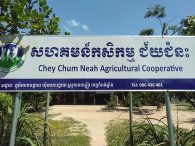
Kampong Chhnang, Cambodia – What started as a savings of a group of farmers in Kauk Banteay Village, Kauk Banteay Commune, Rolea Pa’ear District, Kampong Chhnang in 1998, the Chey Chum Neah Agricultural Cooperative was established in 2008 with 40 members and total capital of KHR 80,000 (Cambodian riels) or USD 19.
With the help of aid from the European Community through the Prasac Project, the cooperative was provided with a fund of KHR 2,390,600 (USD 578) while the Kampong Chhnang Agricultural Department sponsored the cooperative with KHR 2,400,000 (USD 580) as capital. Furthermore, the cooperative also gained support from the Farmer and Nature Net (FNN) and Farmer and Water Net (FWN) through the AFOSP-MTCP2 Programme, World Vision, and CAC. These organizations strengthened the capacities of the cooperative committee as well as the members’ skills in agricultural techniques.
“Chey Chum Neah Agricultural Cooperative was established with the objective of providing financial ease to the members and improving their livelihood,” says Chey Saluot, Chairperson of the Board of the cooperative.
To achieve its objectives, the cooperative tried to encourage more members into joining the cooperative. At present, the coop has 1,447 members (911 are female) with a total capital of KHR 1,147,993,700 (USD 277,640).
“Before joining the cooperative, my family faced hardships on our livelihood. I did not have working capital for my businesses. But after joining the cooperative, our livelihood improved. I now have money saved in the cooperative and I can borrow from the cooperative to start up a business or buy agricultural fertilizer,” shares Nou Pov, a paddy rice farmer, pig raiser, and grocery seller.
The savings of Chey Chum Neah Agricultural Cooperative is kept at ACLEDA bank and, apart from the loans offered to its members, the cooperative has KHR 440,000,000 (USD 106,413) remaining in its balance. The savings of cooperative keeps increasing because its members have trust in it and the cooperative committee is consistent in encouraging its members to save. Other agricultural cooperatives negotiated for loans from Chey Chum Neah Agricultural Cooperative but the cooperative committee has yet to decide on these matters due to the lack of clear management.
In order to attract its members to deposit more savings, the cooperative offers incentives. “If a member deposits savings of KHR 1 million (USD 242) or more, the cooperative will offer them one sarong or one scarf and if a member deposits a savings of KHR 3 million (USD 726) or more, the cooperative will invite them for a tour in Preah Sihanouk Province,” explains Chairperson Saluot.
Amid its success, the cooperative has also faced several challenges. For instance, there were members that took large loans from the cooperative and were unable to make repayments and eventually ran away. These lessons taught the cooperative to make changes to some of its procedures in providing loans to members.
Chairperson Saluot claims that if any member has other outstanding loans with other banks, the cooperative will not approve their loans from the cooperative. Thus, before providing loans to any member, the cooperative committee conducts investigations on site as to whether that member is in debt with any bank.
In addition to the agricultural loan business, Chey Chum Neah Agricultural Cooperative also operates other businesses including the sale of fertilizer and sale and purchase of paddy and rice. Recently, the community bought around 50 tons of paddy from its members and stored this in the cooperative storehouse for selling. Profits generated from such business allowed the cooperative to build a paddy storehouse amounting to USD 20,000. #
About AFOSP-MTCP2
AFOSP-MTCP2 is a capacity building program funded by the European Union (EU) with co-financing from the International Fund for Agricultural Development (IFAD) and the Swiss Agency for Development and Cooperation (SDC). The program is being implemented in seven ASEAN countries through the consortium Asian Farmers’ Association for Sustainable Rural Development (AFA) and La Via Campesina (LVC). AFOSP-MTCP2 supports the strengthening of national farmers’ organizations (FOs) and their national platform towards improving their institutional capacity to deliver economic services to their members as well as to effectively engage them in policy processes. At the ASEAN level, the consortium AFA – LVC works in partnership with the ASEAN Foundation in expanding the spaces for the engagement of FOs in ASEAN processes.

Comments are closed